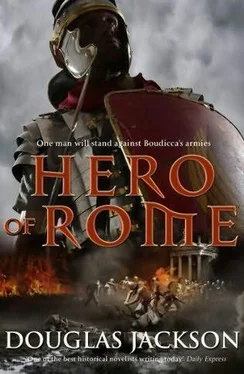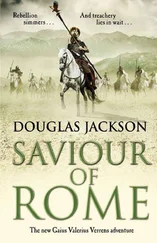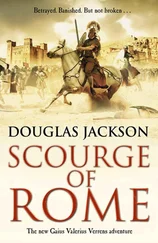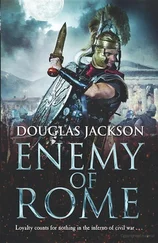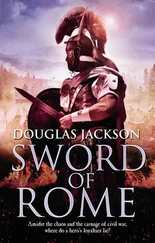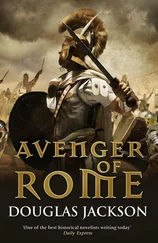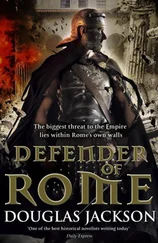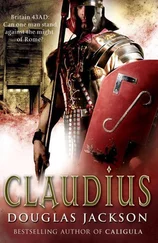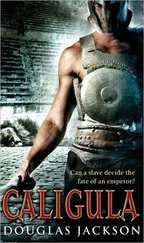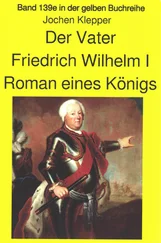Douglas Jackson - Hero of Rome
Здесь есть возможность читать онлайн «Douglas Jackson - Hero of Rome» весь текст электронной книги совершенно бесплатно (целиком полную версию без сокращений). В некоторых случаях можно слушать аудио, скачать через торрент в формате fb2 и присутствует краткое содержание. Жанр: Исторические приключения, на английском языке. Описание произведения, (предисловие) а так же отзывы посетителей доступны на портале библиотеки ЛибКат.
- Название:Hero of Rome
- Автор:
- Жанр:
- Год:неизвестен
- ISBN:нет данных
- Рейтинг книги:5 / 5. Голосов: 1
-
Избранное:Добавить в избранное
- Отзывы:
-
Ваша оценка:
- 100
- 1
- 2
- 3
- 4
- 5
Hero of Rome: краткое содержание, описание и аннотация
Предлагаем к чтению аннотацию, описание, краткое содержание или предисловие (зависит от того, что написал сам автор книги «Hero of Rome»). Если вы не нашли необходимую информацию о книге — напишите в комментариях, мы постараемся отыскать её.
Hero of Rome — читать онлайн бесплатно полную книгу (весь текст) целиком
Ниже представлен текст книги, разбитый по страницам. Система сохранения места последней прочитанной страницы, позволяет с удобством читать онлайн бесплатно книгу «Hero of Rome», без необходимости каждый раз заново искать на чём Вы остановились. Поставьте закладку, и сможете в любой момент перейти на страницу, на которой закончили чтение.
Интервал:
Закладка:
Julius mumbled something and blushed like a boy and Valerius decided he’d better rescue his centurion. ‘You will have the opportunity to continue this reunion later,’ he suggested. ‘I’d like to get the cohort settled in and fed. Julius? Find the granary and organize the replenishment of our stores.’
‘Sir!’
‘I can take you. If you’d agree, tribune?’ Falco offered. ‘My men will lead you to the camp ground. No digging for the Twentieth tonight. The defences are prepared and the latrines ready.’
Valerius nodded. ‘In that case we’ll fall them out once they’re fed. They deserve something after a week on the march. Three hours on the town should do it. But make sure everyone knows I want them back by dark or I’ll have the skin off their backs.’ He paused, remembering previous nights. ‘And I want them back alone. Defaulters to stand guard.’
Falco shook his head. ‘No need for guards here. My men will cheerfully do duty for you. In any case, this is Colonia; you won’t find a quieter place in the whole of the province.’
‘That may be, sir,’ Valerius said mildly. ‘But the First is my cohort and no cohort of mine beds down for the night without a guard. Not in Colonia; not if we were in the Forum in Rome.’
Falco acknowledged the censure with a smile. ‘You shame me, tribune. As you can see it is a long time since I served. Ten years ago I hope my reply would have been exactly the same. Come, Julius, we have much to discuss.’
Valerius followed the honour guard through the arch and on to the decumanus maximus, Colonia’s main street. Once they were within the town he glanced at his surroundings. The insulae had walls of white plaster punctured by small, shuttered windows. Many of the ground floors were occupied by shops offering the kinds of goods you would find anywhere in the Empire: fine glassware and jewellery, cloth and linen of every colour and quality, garum, the fish sauce without which no meal was complete, fruits, even figs that he knew must have been imported from far in the east, and of course wine by the amphora, without which any Roman colony would grind to a halt within a day. Competing vendors called out their prices and leatherworkers and potters showed off their wares. Everything spoke of a prosperous, thriving and settled community. His nostrils were assaulted by the sharp stink of a tanning yard and the strong smell of piss told him a dyer was at work nearby. The legate of a legion once ruled here, but now Colonia would be run by an elected town council. A crowd lined the street and children cheered as the men passed and he knew the legionaries would have their chests puffed out and the centurions would be snarling in their ears if they put a foot out of place. A small triumph in its way, but any triumph was to be savoured. Soldiers generally had a wary relationship with the civilian population. Profits could be made, but soldiers meant extra mouths to feed and more taxes, and civilians didn’t like taxes. Colonia was different. This was an army town, with army wives and army children. They knew how to treat a fighting man. Valerius’s soldiers might be weary after days on the road, but he could sense their excitement at the chance to spend time in proximity to civilization.
But was it truly civilization? His eyes strayed again to the buildings around him, and he noted that many were simply reused barrack blocks, subdivided into homes. Even those that had been rebuilt showed signs of having been thrown up in a hurry. He’d thought Colonia a true example of a Roman provincial town, but now he studied it he realized it was a caricature of one. It had none of the comfortable solidity or deep roots that could be found even in Gaul or Espana. The feeling grew as they turned left on to what had been the via principalis, past the Forum and the curia, which was simply part of the original headquarters complex, extended and with an extra storey added. Here the town’s toga-clad elders gathered on the steps, but he kept his eyes to the front and marched the cohort past with only a covert glance. A protocol must be followed. First, he would settle in his men. Then he would wait for their invitation, which would arrive in its own good time.
Falco had been as good as his word. The tent lines were laid out with symmetrical precision and it would be the work of a few minutes to erect them. No ditches to be dug today. And here at least the defensive wall was intact, probably because the area had yet to be earmarked for development. The old soldier was right; they were as secure as they would be in the fortress at Glevum. Still, he thought, there will be a guard tonight and every night. Civilization could make a soldier soft and he would not allow that to happen. They needed to be hard for what awaited them in the spring. He would make sure they were.
Beyond the flat, hardened earth of the camp ground was the beginnings of a semicircular structure which must be the town’s theatre. And beyond that again, something which astonished him.
The Temple of Claudius.
Of course, he had heard tales of its grandeur, but nothing had prepared him for the reality. It was the glory of Britain. Constructed of creamy white marble and glowing like a beacon even in the flat light of an early autumn afternoon, the temple dwarfed everything around it. Wide, fluted columns five or six times the height of a man supported an enormous triangular architrave with a decorative marble frieze showing a bull being led to the sacrifice, and another depicting the Emperor Claudius riding in a chariot. Gold statues of winged Victory rose tall at each corner of the pitched roof. The temple stood in the centre of a walled precinct perhaps a hundred and fifty paces square with the entrance in the middle of the southern wall, which was set back from the line of the main street. Building plots and vegetable gardens dotted the area around the precinct, but the isolation merely served to emphasize the structure’s immense scale. Intrigued, Valerius left his officers to set up the cohort headquarters and walked to the front of the precinct to take a closer look. Here the wall was lower and he was able to see the massive building in its entirety. He had been taught to admire the balanced symmetry and perfection of form of fine architecture, and in the Temple of Divine Claudius he found it manifested in a place he would never have expected.
‘Wonderful, isn’t it?’ He turned to discover a tall, balding figure in a pristine white toga standing behind him. The man studied him complacently. ‘The Emperor sent an architect from Rome to supervise the building and every ounce of marble was carried here from the quarries at Carrara. It is of similar design to the temples at Nemausus and Lugdunum in Gaul, larger than the first, but slightly smaller than the second. Tiberius Petronius Victor, quaestor and adviser to the council,’ he introduced himself.
Valerius smiled to show he was impressed, but something in the man’s voice — a certain unnecessary arrogance — irritated him. Pride was something he understood, but it was as if Petronius wanted him to believe he’d personally laid every stone.
‘Tribune Gaius Valerius Verrens of the Twentieth. I lead a detachment of the First cohort. We will be based here for the winter.’
Petronius smiled in his turn, showing an array of white teeth that were so unnaturally perfect they might have belonged to another, much younger man. ‘I knew of your coming, of course. I myself served with the staff of the Second.’ The words were accompanied by a certain inflexion that made Valerius aware their status among the equestrian classes was approximately equal, but also raised an intriguing question in the younger man’s mind. Normally, a quaestor would serve on the procurator’s staff for two years, but Petronius gave the impression of being a permanent member of the city’s bureaucracy. ‘We have much to do here, as you see. Colonia should be the pride of Rome, yet we have barely started. In the beginning we were encouraged to be ambitious, perhaps overly so. Projects were begun but never properly completed, public buildings commissioned but never built. The veterans,’ his tone made it clear he didn’t care to be included among them, ‘preferred to spend their money and their time on the land. Even then, we might have succeeded, but the temple…’
Читать дальшеИнтервал:
Закладка:
Похожие книги на «Hero of Rome»
Представляем Вашему вниманию похожие книги на «Hero of Rome» списком для выбора. Мы отобрали схожую по названию и смыслу литературу в надежде предоставить читателям больше вариантов отыскать новые, интересные, ещё непрочитанные произведения.
Обсуждение, отзывы о книге «Hero of Rome» и просто собственные мнения читателей. Оставьте ваши комментарии, напишите, что Вы думаете о произведении, его смысле или главных героях. Укажите что конкретно понравилось, а что нет, и почему Вы так считаете.
